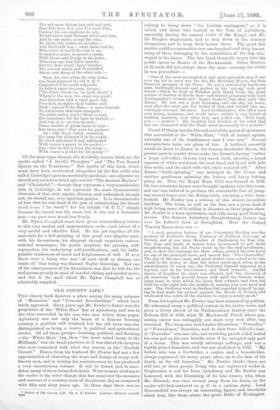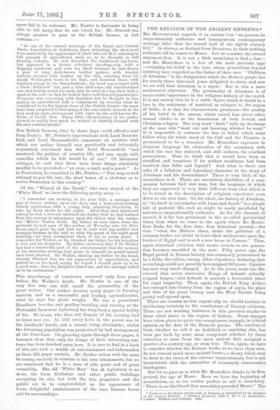OLD COUNTY LIFE.*
THIS cheery book deserves a place among the many volumes of" Memories " and "Personal Recollections" which have lately appeared. Sixty years ago Mr. Fowler's father was the proprietor of the White Hart' Inn at Aylesbury, and was in due time succeeded by his son, who now writes these pages. Aylesbury was not only the heart of a famous hunting -country, a position still retained, but the old town was also distinguished as being a centre in political and agricultural -circles. Of all these groups—hunting, political, and farming —the ' White Hart' Inn, then " the most noted house in the Midlands," was the head-quarters, as it was also of the lawyers who were connected with what was known as the " Norfolk Circuit." Hence, from his boyhood Mr. Fowler had not a few opportunities of observing the ways and doings of many well- known men, and in writing his reminiscences he has produced a very entertaining volume. It will be found rich in anec- dotes, many of them being first-hand. What is most striking to the reader is the utter change that has come over the manners and customs of a country town of the present day as compared with fifty and sixty years ago. In those days there was no
•
1 Rohm)* of Old County Life. By J. K. Fowler. London; Edward Arnold,
892.
railway to bring down "the London contingent," as it is called, and those who hunted in the Vale of Aylesbury, especially during the annual visits of the King's and Mr. De Burgh's staghounds, had to stay down in the country themselves, and to keep their horses there. The great Inn stables could accommodate over one hundred and sixty horses many of them belonging to the notabilities of the day, who stayed in the house. The late Lord Granville began here his public career as Master of the Buckhounds. Other Masters of Hounds did not always show the same courtesy for which he was proverbial :—
" One of the most accomplished and most agreeable men it was ever my lot to meet was the late Mr. Mowbray Morris, the then financial manager of the Times. He was a remarkably handsome man, faultlessly dressed and perfect in his ' got-up,' rode good horses—which he kept at Winslow with Harry Poole, the great arbiter of fashion in Savile Row—and hunted generally with Lord Southampton's hounds and Squire Drake's,' but often with the Baron! He was not a good horseman, and one day his horse, soon after the start, got the better of him, and carried him un. wittingly amongst the pack. Lord Southampton, who often used very strong language, and would never submit to any breach of hunting manners, rode after him, and yelled out, Hold hard, you — printer !' His lordship had decided in his mind that any one connected with the Times must necessarily be a printer."
Count D'Orsay was the life and soul of the party of sportsmen that assembled at the White Hart,' " full of animal spirits, certainly one of the handsomest men I ever saw." Several characteristic tales are given of him. A brilliant assembly would sit down to dinner in the famous Rochester Room, the greater part in scarlet dress-coats, the Count's having "rather a large roll-collar, thrown very much back, showing a broad expanse of white waistcoat, the coat lined and faced with pale blue satin, and the skirt with rich white watered silk." After dinner, "knife-spinning" was indulged in, the Count and another gentleman spinning the knives, and heavy betting going on. Here the Royal Hunt Club was formed in 1835. On two occasions horses were brought upstairs into this room, and one was induced to perform the remarkable feat of jump-
ing several times over the dining-table, carrying a rider bare- backed. Mr. Fowler was a witness of this almost incredible incident. The town, as well as the Inn, mw a great deal of high living, some of it ending in disaster, as these pages show. Mr. Fowler is a keen sportsman, and tells many good hunting stories. The famous Aylesbury Steeplechasing Course was
over his father's farm at Broughton. Here the Oxford 'Varsity Races were run :—
" A most amusing feature of one University Meeting was the prowess of Professor Neate, Professor of Political Ecoaomy at Oxford, and at one time Member of Parliament for that city. The dons and heads of houses were determined to put down steeplechasing, but old Neate stood up for the undergraduates ; and, to show his contempt for their rulers, entered his own horse for one of the principal races, and named him Vice-Chancellor.' The day of the race came, and great doubts were raised as to who would be the jockey to steer the noted quadruped, when, to the astonishment of every one, the Professor himself appeared in a top-hat, and in his shirt-sleeves and black trousers. Amidst shouts of laughter the start was effected, and 'the observed of all observers took several fences well until the famous water- jump came in view, which his horse first refused, and then fell with his rider right into the middle of, sousing him over head and ears. The Professor went no farther, but consoled himself by say- ing he had made his protest against the Heads of Houses, and vindicated the rights of the students to enjoy a manly sport."
From his boyhood Mr. Fowler has been attracted by polities. He witnessed many a political contest in his native town, and gives a lively sketch of its Parliamentary history since the Reform Bill of 1832, when W. Mackworth Praed, whose pro- mising career was unhappily cut short very soon after, was returned. The burgesses voted under the ancient Potwaller," or " Potwa,lloper," franchise, said to date from Alfred's time. A " Potwaller " was one who, not receiving parish relief, boiled his own pot on his own hearth, even if he occupied only part
of a house. This was nearly universal suffrage, and was a highly-prized franchise, and was not abolished in 1832. " My
father, who was a freeholder, a renter, and a householder, always registered, for many years after, up to the date of his
death, on the old franchise." Mr. Fowler thinks there are still two or three people living who are registered under it.
Hughenden is not far from Aylesbury, and Mr. Fowler was honoured with the friendship of its late owner, who, when Mr. Disraeli, was once turned away from its doors, as the reader will find narrated on p. 47 in a curious story. Lord Beaconsfield was always an interesting figure, and anecdotes about him, like those about the great Duke a Wellington
never fail to be welcome. Mr. Fowler is fortunate in being able to tell many that he can vouch for. Mr. Disraeli was always anxious to pose as the British farmer, in full costume :-
"At one of the annual meetings of the Royal and Central Bucks Association, at Aylesbury, those attending the show-yard were startled by the appearance of their beloved M.P. entering in full panoply of agricultural mail, or, as he thought, in full farming costume. He had discarded the traditional top-boots, but appeared in a brown velveteen shooting-coat, with a flapping waistcoat, and over his black trousers he had drawn a pair of long dark-brown leather gaiters, with wooden buttons covered with leather up the side, reaching from his dandy Wellington boots to his hips, and fastened there with leathern straps to his brace-buttons ; his head was covered with a black ' billyeock ' hat, and a blue bird's-eye silk handkerchief was tied loosely round his neck, and he carried a big stick with a spud at the end ; in fact, he looked like a well-dressed gamekeeper. Everyone was screaming with laughter, but he thought he was paying us agricultural folk a compliment by wearing what he considered to be the typical dress of the British farmer—he must have been surprised to find many of the real article dressed in the best modern style, and several with coats by the well-known Mr. Poole, of Savile Row. These little idiosyncrasies of his rather showed in reality how much he wished to identify himself with his own country-people."
Few British farmers, alas ! in these days could afford a coat from Poole's. Mr. Fowler's conversations with Lord Beacons- field, and Lord Beaconsfield's comments on matters with which our author himself was practically and intimately acquainted, convinced him that Lord Beaconsfield " bad mastered the politics of country life, and was ready with remedies which he felt would be of use." Of labourers' cottages, he said that there were three things absolutely needful to be provided,—" an oven, a tank, and a porch." As to Protection, he remarked to Mr. Fowler,—" You may as well attempt to put life into the dead bones of a skeleton as to revive Protection in this country."
Of the " Wizard of the North," who once stayed at the White Hart,' we have the following pretty story :—
" I remember one evening, in the year 1828, a carriage and pair of horses pulling up at our door, and a benevolent-looking elderly gentleman, with a young lady, alighting therefrom, to take up their abode for the night. After they had dined and retired to bed, a servant informed my father that he had learned from the servant in attendance upon the visitor that his master was ' Mister' Walter Scott. My father at once knew, from the portraits ho had seen of the author of Waverleg, who his illus- trious guest must be, and told me to wait with my mother and younger brother in the hall to wish the guest of the night good morning—we were youngsters then of six or seven years. I remember Sir Walter, as he thanked my father for his attention to him and his daughter. My father answered, that if Sir Walter had had a hundredth part of the entertainment that the perusal of his charming writings bad given to himself, he would indeed have been pleased. Sir Walter, shaking my father by the hand, warmly thanked him for his expressions of appreciation, and patted me on the head, saying he hoped I should grow up to be a good man ; then his daughter kissed me, and the carriage rolled on to its destination."
This interchange of courtesies occurred only four years before Sir Walter's death. Mr. Fowler is one of the very few who can still recall the personality of the great writer. Our author devotes many pages to farming matters, and as a successful and leading agriculturalist, what he says has great weight. He was a prominent
Shorthorn breeder, and poultry breeding and rearing on the Prebendal farm near Aylesbury has long been a special hobby of his. He is one who does not despair of his country, bad as times now are. In 1831 every farm in the parish was in the landlords' hands, not a tenant being obtainable ; whilst the labouring population was pauperised by bad management of the Poor-Law. On glancing again through these pages, it becomes clear that only the fringe of their interesting con- tents has been touched upon here. It is rare to find in a book of this size such a wealth of entertainment and information as these 264 pages oontain. Mr. Fowler writes with the most lamming modesty in relation to his own attainments, but we are convinced that he is a man of able parts and of great versatility. The old 'White Hart' Inn at Aylesbury is no more, the Corn Exchange and other public buildings occupying its site, but both the late proprietor and the public are to be congratulated on the appearance of these delightful reminiscences of the once famous house and its surroundings.



































 Previous page
Previous page